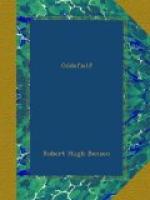The Duke of York, during these proceedings, saved himself very well. When the Bill for the disabling of Papists from the holding of office or of sitting in either House of Parliament, had passed through the Commons, he made a speech upon it in the House of Lords, speaking so well that others as well as he were moved to tears by it. He said that his religion should be a matter between his soul and God only; and should never affect his public conduct; and this with so much weight that the decision was given in his favour, since he was the King’s brother. I should never have thought that he could have done so well.
Mr. Coleman was the first to be brought to trial, at the beginning of December, for he came back and gave himself up the day after he had at first fled. He was already pre-judged; for so violent was the feeling against the Papists that my Lord Lucas said in the House of Lords that if he could have his way, he “would not have even a Popish cat to mew and purr about the King.” Coleman, I say, was the first of those who had before been accused; but a Mr. Stayley, a Catholic banker (who had his house not far from me in Covent Garden), was even before him judged and executed, on account of some words that a lying Scotsman had said he had heard him use in the tavern in the same place.
I did not go to the trial of Mr. Coleman; for that I had nothing to say for him; and indeed Mr. Coleman’s own letters—written three or four years ago—were the severest witnesses against him, in which he had written to Father La Chaise—(whom Oates at first called Father Le Shee)—the French King’s confessor, and others, that if he could lay hands on a good sum of money, he could accomplish a great project he had for the restoration of the Catholic religion in England. (These letters were found in a drawer he had forgotten, when he had burned all the rest; and proved very unfortunate for him.) He meant by this, I have no doubt, the bribing of many Parliament-men to win toleration, and to get His Royal Highness restored as Lord High Admiral. He said this was his meaning; and I see no reason to doubt it, for he was a pragmatical kind of man, full of great affairs; but Chief Justice Scroggs waved it all away; and it was made to appear exactly consonant with all that Oates and Bedloe had said as to the project of killing the King. So great was the excitement, not of the common people only, but of those who should have known better, and so shrewd were these who took advantage of it, that my Lord Shaftesbury, who was waxing very hot upon the supposed Plot, for his own ends, was heard to say that any man that threw doubt on the plot must be treated as an enemy. Mr. Coleman was executed at Tyburn on the third day of December.
* * * * *
The trial of Father Ireland, Mr. Grove and Mr. Pickering—who was a Benedictine lay-brother—was opened on the seventeenth day of December, in the Sessions House at Justice Hall in the Old Bailey.




